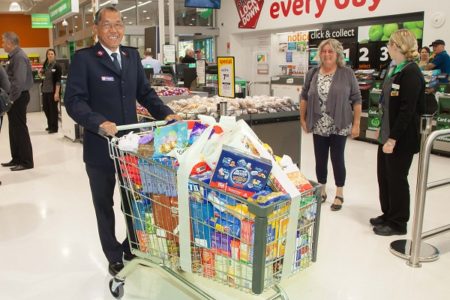
New research has highlighted a huge gap in New Zealanders’ understanding of the role foodbanks play in the community, including what triggers the need for help.
The research, conducted ahead of Countdown’s Winter Appeal to help stock The Salvation Army’s foodbanks this winter, aims to better understand attitudes and perceptions of foodbanks and the people who use them.
The vast majority (84 per cent) of New Zealanders believed that unemployment was the most likely reason someone would need a food parcel. Having a large family to provide for (77 per cent), high debt (66 per cent) and poor budgeting skills (66 per cent) were also thought to be key factors.
However, The Salvation Army’s National Secretary for Social Services, Major Pamela Waugh, says food donated in the Countdown Winter Appeal for foodbanks is just as likely to go to someone who’s working and having a short period of hardship.
“Nearly a quarter of people seeking foodbank assistance from The Salvation Army nationally are working and earning money. Most of our clients are budgeting down to the last cent after paying a mortgage or increasing rents, or paying for childcare so mum and dad can go to work. The research shows there’s a massive gap between the perception of foodbanks and the reality that we see every day,” says Major Waugh.
Of all respondents, 15 per cent said they had relied on a foodbank at some point in their lives, and of these, just 33 per cent listed job loss as the reason. Large unexpected bills (such as car or house repairs) were listed as the top reason people sought food assistance (45 per cent).
Almost half of respondents (47 per cent) said they would turn to friends and family for help if they were struggling, followed by Work and Income (23 per cent), before considering a food bank (11 per cent). But Major Waugh says, “In most cases, friends and family are also struggling, and family dynamics and pride can get in the way. There are many complex reasons behind requiring foodbank assistance. Some families need help with a short-term crisis, others we help with longer term solutions to become independent and stable.”
Countdown’s Winter Appeal encourages customers to make a food donation in-store in the designated purple Food Rescue bins or online via The Foodbank Project. Food and groceries are then distributed to those in need across the country through The Salvation Army’s community hubs. Countdown shoppers can also donate money at the checkout in store. “This is needed to help keep the foodbank lights on and bills paid at a time of heavy demand for their services,” Major Waugh says.
Countdown’s general manager corporate affairs, James Walker, says Countdown’s Food Rescue Winter Appeal is a tangible way that people can help New Zealanders in need this winter.
“Wherever possible, Countdown’s policy is to donate safe, high-quality surplus food to The Salvation Army and other local foodbanks throughout New Zealand. This Winter Appeal is an extension of our Food Rescue programme, and enables The Salvation Army to help Kiwis in need. We’re proud to support them.”
The Salvation Army expects to distribute more than 56,000 food parcels to families this year. The most needed items this winter include:
- Rice and pasta
- Tinned goods such as fish, baked beans and spaghetti
- Socks, tissues, throat lozenges and vitamins
- Toiletries and sanitary items.
Since 2011, Countdown stores have partnered with The Salvation Army and other local foodbanks and food rescue organisations to donate food that would otherwise go to landfill.








